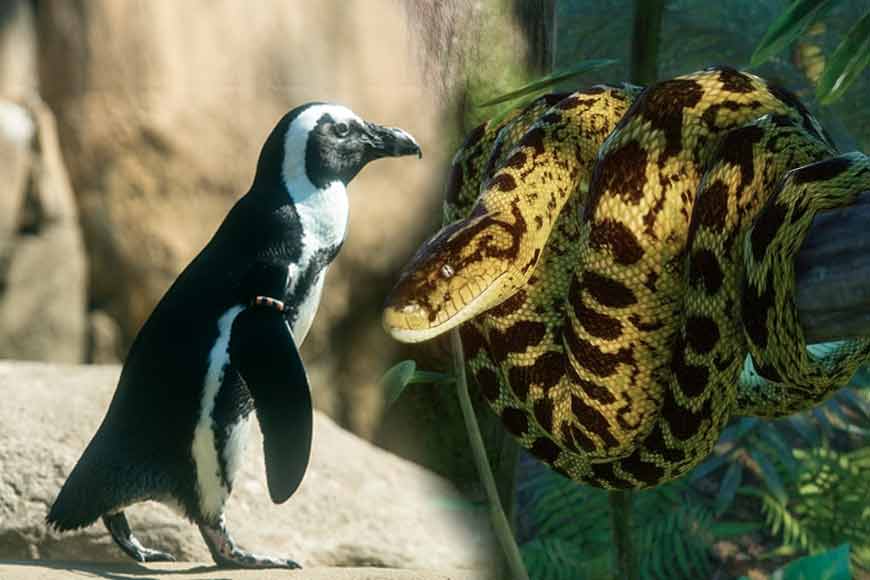Alipore Zoo gears up to house green anacondas and penguins: Will they survive?

Come winter and all roads seem to lead to the Alipore Zoological Garden, also known as the Calcutta Zoo, the oldest zoological park in India and a major tourist attraction that allure sightseers from all across the country. Spread over an area of 46.5 acres, the zoo attracts visitors to explore the abundant and plentiful wildlife of the country at its best. Almost every year before winter, the zoo authorities keep adding new animals to their vast repertoire to make the zoo look more attractive for the explorers. This year, plans are afoot to bring in green anaconda (Eunectes murinus), also known as giant anaconda and penguins to add to the joy of the visitors.
Anacondas became trending topic following Hollywood’s fright flick, ‘Anaconda’ that was released in 1997. The film caught the imagination of the masses so intensely that an entire horror film series on anacondas was launched. At up to 550 pounds, the green anaconda is the largest and heaviest snake in the world. It reaches a length of up to 5.21 meter (17 ft 1 inch). They are found in the Amazon rainforest in Brazil and Ecuador. The reptile section in the zoo already houses yellow anacondas (E.notaeus) or southern anaconda. Four of these were brought to Alipore Zoo in 2019 and they have adapted to the new environment very well. In fact, in July 2020, zoo authorities were jubilant when the resident yellow anaconda gave birth to 11 snakes inside the zoo enclosure. Currently, 16 yellow anacondas reside in the reptile park within the zoo campus. The addition of green anacondas, which are being brought from Sri Lanka, will add to the attraction of the zoo.
Plans are underway to import penguins from Cape Town, South Africa and house them at Alipore Zoo. A couple of years ago, penguins were introduced at Mumbai’s Byculla Zoo but two of them died and the zoo authorities came under a lot of flak. However, the penguin enclosure found a lot of popularity with the zoo visitors. Before the pandemic, the zoo attracted over 30,000 people over the weekends. The zoo charged the visitors extra for penguin enclosure. The authorities at Alipore Zoo are cautious and want to play safe. The date of arrival of these cold-water sea birds has not yet been finalized but they plan to take all measures before they get the overseas ‘guests’ make ‘feel at home’ in Kolkata. Besides, there is a plan to bring African lion as well.
The import of penguins has raised a lot of apprehension among animal experts. The memory of a major setback for the country’s ambitious Project Cheetah programme last year is still fresh in public memory. As part of the project, 24 African cheetahs from Namibia and South Africa arrived in Kuno National Park, Madhya Pradesh, in September last year and February this year. Many of them were gradually released into the wild in the Park. Some were recaptured and brought back to bomas or small enclosures in the Park due to reasons such as territorial fights and when they ventured outside the Park and into adjoining agricultural areas. However, of the total 24 cheetahs, nine including three cubs died within just five months of arrival. The cause of their deaths was due to infection in wounds caused by the radio collars around their necks. According to a report, South African and Namibian experts who were part of the Steering Committee wrote separate letters to the Supreme Court, raising concerns on cheetah monitoring on the ground, as well as timely and appropriate veterinary care. The experts said that some of the cheetah deaths could have been avoided “had the experts been brought into the picture rather than being ‘ignored’ and used as mere ‘window-dressing.'”
In this context, renowned immunologist and regenerative biologist, Professor Ena Ray Banerjee, who is currently the head of the Department of Zoology, University of Calcutta, shares her views and says, “To many people, a trip to the zoo is a fun day out for the family. Visiting a zoo is a chance for people to see exotic animals they would otherwise be unable to see. While zoos can definitely be exciting places for families to visit, the fact remains that they are bad for animals. In most cases, animals in zoos lead very unhappy lives. Animals are forced to live in unnatural, stressful, boring environments, leading to a lack of mental and physical stimulation. They are removed from their natural habitats and confined to small limited spaces. When we visit zoos, we can see the zoo authorities often go to great lengths in order to recreate the animals’ natural habitats.
However, this is often not much more than an illusion. A small exhibit never truly captures the vastness of the open world. Renowned British naturalist, writer, zookeeper, conservationist, and television presenter, Gerald Durrell pioneered the concept of zoo-led conservation. According to Durrell, “behavioural enrichment” of the animals is a central concept in modern zoo keeping. Not only must a species’ physical needs be met in terms of the right orgonomy (food, water, shelter, space and climate), but also its psychological needs, i.e. its ability to express natural behaviour in appropriate social groupings in terms of acquiring food (or not being acquired as food!), creating nests or shelters, nurturing offspring etc. These aspects can ensure the individual animal’s well-being.
Penguins are gregarious birds who love to socialize. They are monogamous and hence if we provide them with compatible companions, provide food and an environment similar to their natural habitat; they might adopt and live in a different geographical realm. However, we need to keep in mind the vast array of micro or nano microbiota (microbiota are the range of microorganisms that may be commensal, mutualistic, or pathogenic found in and on all multi-cellular organisms, including plants) present in the soil and atmosphere. These affect both animals and humans exposed to each other. In parasite interaction, we talk about permissive and non-permissive dead-end host. A dead-end host is an intermediate host that does not generally allow transmission to the definite host, thereby preventing the parasite from completing its development. For example, humans are dead-end hosts for Echinococcus canine tapeworms. Therefore, it is essential to create a barrier between the bird and humans for prevention of parasite interaction.”
The challenges are daunting indeed but Kolkata zoo authorities are ready to throw down the gauntlet and provide the best possible habitat for the animals and birds they are planning to import and introduce to spectators this winter.

-Scheme-during-Rabi-2025-26--Agriculture.jpg)









